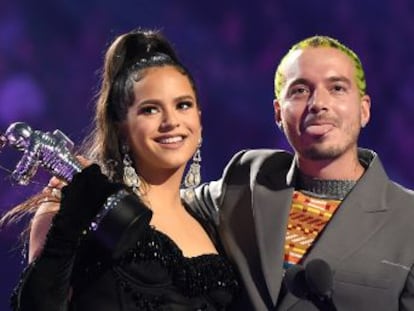Why does Rosalía attract so many haters in her home country?
The international star continues to divide public opinion in Spain, whether over her way of singing flamenco or her stance on the Catalan independence movement

There are three things you will find in the bathrooms of music festivals: drugs, bad smells and opinions. After Rosalía’s concert at Primavera Sound in June, the fans of the Barcelona-born singer described her as a “goddess,” while her detractors complained: “she did the same thing in Coachella,” “she was so unlikeable,” and “I preferred her when she wasn’t a marketing product.” These judgments are three drops in the tsunami of public opinion against Rosalía, a phenomenon that has grown as the singer has become increasingly successful.

Rosalía has been criticized for singing flamenco when she is not a Gypsy, as though she were wearing “a costume” that can be put on or off taken off at will. In a message on Twitter, Gypsy activist Noelia Cortés told Rosalía: “I can’t stand that you have more opportunities than Gypsy women who have been singing about their roots since they were children.” She’s also been accused of desecrating the tradition of pure flamenco (the famous flamenco singer, Camarón de la Isla, received a similar criticism in the early 1980s). And when the 25-year-old singer won two Latin Grammys in 2018, she was attacked for not mentioning “the repression suffered by the Catalan people,” in reference to the Catalan independence movement and the separatist leaders in custody for their involvement in the 2017 secession push. Indeed, Quim Torra, the regional premier of Catalonia and a hard-line supporter of the independence movement, refused to congratulate the singer.
To those who have criticized her for not defending the independence drive, Rosalía has said she “would like to have more knowledge to express an opinion on such a delicate subject, my opinion is not more important than anyone else’s.” To those who have accused her of cultural appropriation, she has pointed to her academic studies, while admitting her privileged position and wishing that her success would bring greater visibility to Gypsy artists.
But the controversies surrounding Rosalía go beyond her stance on the Catalan independence movement and have even led to sub-controversies. For instance, when the Association of Feminist Gypsies for Diversity accused her of making the Los Chunguitos song Me Quedo Contigo sound less “Gypsy,” many criticized the organization for being sexist, arguing that it was unfair to attack Rosalía and not male singers like Antonio Vega or French-Spanish musician Manu Chao who have also performed covers of the song.

Rosalía has become the center of a cultural war that has been raging on social networks, in bars and between friends for years. Those who claim to hate Rosalía are not content to just complain that they do not like her music, they want to knock the singer off her pedestal and convince her fans they are wrong about her This offensive strategy often means skipping over the fact that Rosalía spent 18 months independently composing, producing and mixing her album “El Mal Querer,” and it was only after the response to the songs Malamente and Pienso en Tú Mirá (she paid to make the video clips for both tracks) that Sony offered her a contract. Rosalía haters are also missing something very obvious: when a song is successful, it is simply because it is liked by a lot of people. While some argue that the Spanish media has exaggerated her success in the United States, the facts back her up.
Rosalía has performed in three international music festivals: Coachella, Glastonbury and Lollapalooza. She contributed to the soundtrack of the hit series Game of Thrones, and has also worked with international stars like Pharrell Williams, Billie Eilish and Dua Lipa. Former US president Barack Obama included her song Con Altura in his summer playlist, and it is rumored that Rosalía will record a song with Beyoncé. But there are still people who think it is all hype. As though Rosalía could fool The New York Times which called her “the Rihanna of flamenco” in an in-depth profile. Denying the international success of Rosalia is like believing the Earth is flat.
Most of her critics are missing a party to which everyone is invited. Rosalía has a song to meet all tastes – be it flamenco, Latin or urban. Those who refuse to enjoy her music are forgetting that it is better to dance than to hate. At the end of the day, her fans do not care that other people criticize the singer. What’s more, even people who do not like Rosalía are not going to miss one of her performances. Her success is undeniable.
English version by Alicia Kember.
Tu suscripción se está usando en otro dispositivo
¿Quieres añadir otro usuario a tu suscripción?
Si continúas leyendo en este dispositivo, no se podrá leer en el otro.
FlechaTu suscripción se está usando en otro dispositivo y solo puedes acceder a EL PAÍS desde un dispositivo a la vez.
Si quieres compartir tu cuenta, cambia tu suscripción a la modalidad Premium, así podrás añadir otro usuario. Cada uno accederá con su propia cuenta de email, lo que os permitirá personalizar vuestra experiencia en EL PAÍS.
En el caso de no saber quién está usando tu cuenta, te recomendamos cambiar tu contraseña aquí.
Si decides continuar compartiendo tu cuenta, este mensaje se mostrará en tu dispositivo y en el de la otra persona que está usando tu cuenta de forma indefinida, afectando a tu experiencia de lectura. Puedes consultar aquí los términos y condiciones de la suscripción digital.










































